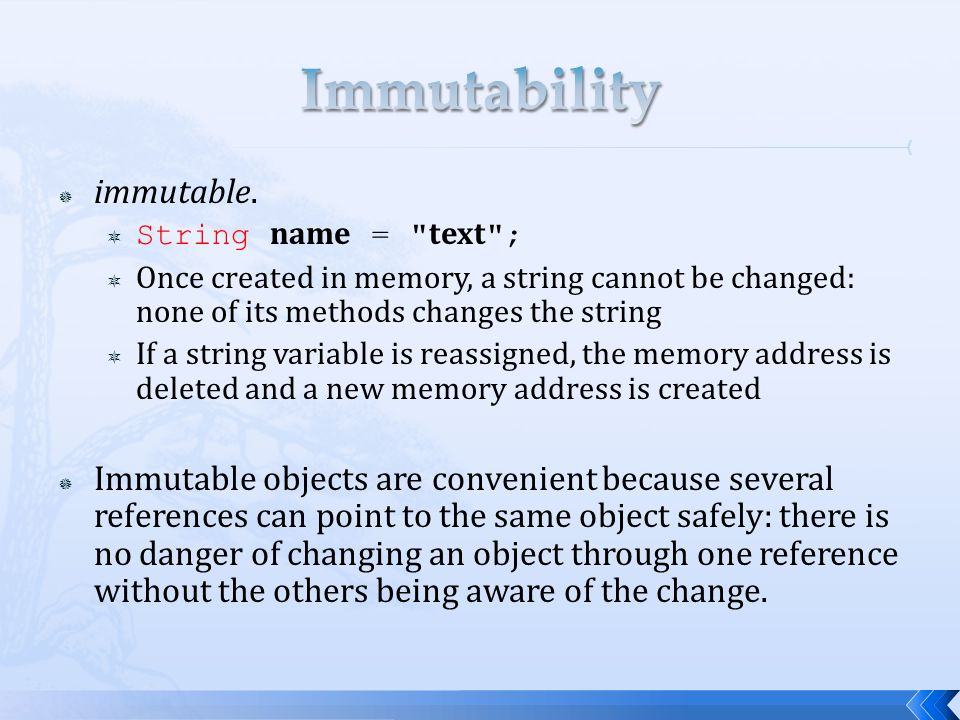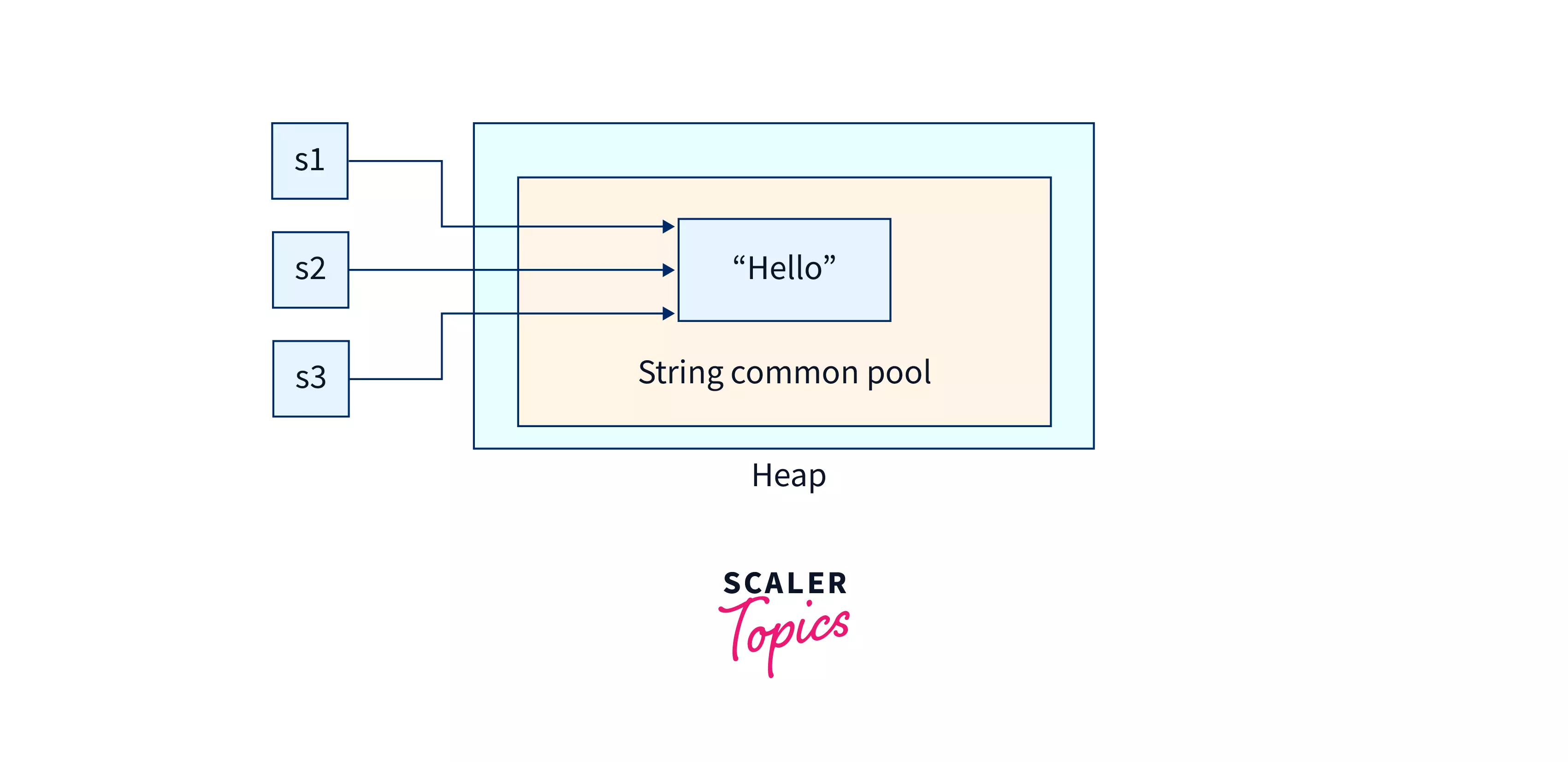Why Are Strings Immutable in Java? Security and Efficiency Perks
Discovering the Advantages of Unalterable Strings in Modern Shows Paradigms
In the realm of contemporary programs standards, the idea of unalterable strings stands as a foundation of durable software development. The benefits they provide exceed mere ease; they basically modify the method data is dealt with within applications. By adopting immutable strings, developers can ensure boosted data stability, improved string safety, simplified debugging processes, boosted protection measures, and effective efficiency optimization. These benefits function as a testimony to the profound impact that embracing immutability can have on the dependability and performance of software application systems.
Boosted Data Stability

By avoiding the adjustment of string items, immutability gets rid of the risk of unintentional changes to the data they hold. This not just improves the safety and security of the info but additionally boosts the reliability of the code that counts on these strings.
Immutability also sustains more secure multithreading settings, as concurrent access to unalterable strings does not posture the threat of information corruption via synchronised adjustments. This property streamlines the procedure of taking care of strings in identical shows circumstances.
Basically, immutability works as a safety guard around the data saved within strings, boosting their integrity by ensuring that when specified, their worths continue to be unchanged throughout the program's execution.

Enhanced String Safety And Security
Immutable strings improve the thread safety of programs by making sure that once a string item is developed, its worth can not be changed. This building eliminates the risk of simultaneous strings attempting to change the same string concurrently, which can result in information corruption or irregular states in the program - Why are strings immutable in Java?. In a multi-threaded environment, where numerous strings access and manipulate information at the same time, the immutability of strings gives a level of security by guaranteeing that the data remains unmodified throughout its lifecycle
Simplified Debugging Processes
Provided the boosted thread safety helped with by unalterable strings, a significant benefit occurs in the realm of simplified debugging procedures. Unalterable strings, when produced, can not be changed, making it easier to trace the flow of data and determine the source of pests in a program. This immutability guarantees that strings continue to be consistent throughout the implementation of the program, decreasing the chance of unforeseen modifications that could bring about errors.
When debugging with mutable strings, programmers typically come across issues where a string's worth is customized inadvertently, making it testing to identify the root cause of a bug. Nevertheless, with unalterable strings, the data stays unchanged, permitting designers to focus on evaluating the actual reasoning of the code as opposed to tracking down where and when a string was customized improperly.
Furthermore, immutable strings streamline the debugging process by enabling simpler reproduction of pests. Since unalterable strings do not alter state, programmers can recreate and examine insects more effectively, official website causing quicker identification and resolution of issues within the codebase. This streamlined debugging process ultimately adds to higher software application top quality and improved overall advancement effectiveness.

Raised Protection Steps
Enhancing data security and strengthening system integrity, the utilization of unalterable strings in software application applications contributes dramatically to raised safety and security steps. Unalterable strings, once created, can not be changed, offering an important protection against destructive tampering or unauthorized accessibility. By guaranteeing that delicate information kept in strings continues to be unchanged throughout the program's execution, the danger of information breaches or injection strikes is significantly reduced. Why are strings immutable in Java?. Immutable strings additionally play a vital function in preventing common security vulnerabilities such as barrier overflows and SQL injection assaults, as efforts to manipulate string information at runtime are naturally restricted.
Additionally, the immutability of strings improves the predictability of program find out here habits, making it less complicated to verify inputs and prevent unanticipated adjustments that could jeopardize security. This predictability simplifies the procedure of auditing and confirming code, allowing programmers to identify potential protection technicalities better. Overall, integrating immutable strings into software application growth techniques not just enhances the toughness and integrity of applications however likewise reinforces their durability versus security risks.
Effective Efficiency Optimization
Structure upon the structure of increased security steps accomplished through the use of immutable strings, an essential facet to take into consideration in software application growth is effective performance optimization. When handling mutable strings, operations like concatenation or substring production frequently cause the production of brand-new string things, bring about memory expenses and enhanced handling time. Nevertheless, with unalterable strings, these procedures can be enhanced to boost efficiency. By allowing strings to stay constant and stable, immutable strings facilitate much better memory administration and caching chances, ultimately boosting the total efficiency of the software application.
Because immutable strings can not be customized once produced, they can be shared throughout threads without the risk of unanticipated adjustments, minimizing the need for synchronization devices and enhancing concurrency. Unalterable strings simplify debugging processes as designers can rely on that a string's value will certainly remain consistent throughout the program's execution, eliminating prospective mistakes triggered by mutable state modifications.
Verdict
In verdict, the benefits of utilizing immutable strings in modern-day programs standards can not be overemphasized. Enhanced information honesty, boosted thread safety, streamlined debugging processes, enhanced official website safety measures, and reliable performance optimization all add to the general effectiveness of programming jobs. By integrating immutable strings into programs techniques, programmers can benefit from a much more dependable and durable codebase.
Immutability, a key feature of strings in shows languages such as Java and Python, makes certain that when a string object is created, it can not be altered or modified.Immutable strings boost the string safety of programs by ensuring that as soon as a string object is produced, its worth can not be changed. Immutable strings also play an important role in preventing common protection vulnerabilities such as buffer overflows and SQL shot attacks, as efforts to adjust string information at runtime are naturally restricted.
By permitting strings to remain continuous and stable, unalterable strings assist in better memory administration and caching possibilities, inevitably boosting the total effectiveness of the software.
Unalterable strings streamline debugging procedures as developers can rely on that a string's worth will continue to be consistent throughout the program's implementation, eliminating prospective mistakes caused by mutable state adjustments.